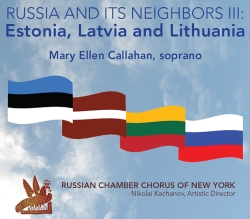 Recent seasons of the Russian Chamber Chorus, America’s preeminent Russian
vocal ensemble, have witnessed the group branching outward, beyond its solid
base in the choral music of Russia, to embrace music from other cultures in the
Eastern part of Europe and further. The group’s concert offering for June
2016 continues this trend. Titled “Russia and Its Neighbors, Part Three,”
it will feature contemporary choral works from the three Baltic countries,
Latvia, Lithuania and Estonia, in addition to works from Russia.
Recent seasons of the Russian Chamber Chorus, America’s preeminent Russian
vocal ensemble, have witnessed the group branching outward, beyond its solid
base in the choral music of Russia, to embrace music from other cultures in the
Eastern part of Europe and further. The group’s concert offering for June
2016 continues this trend. Titled “Russia and Its Neighbors, Part Three,”
it will feature contemporary choral works from the three Baltic countries,
Latvia, Lithuania and Estonia, in addition to works from Russia.
There are marked differences between the music traditions of the three Baltic States. One unifying factor is the role music played in bringing independence to all three with the collapse of the Soviet Union in 1991. Seeking to recover their sophisticated, ancient, pre-Soviet folk-music traditions, asserting their distinct culture, was a catalyst for their separation from the Soviet Union, as illustrated so memorably in James & Maureen Tusty’s film The Singing Revolution. If we might over-generalize, one element that is common in Baltic music, as demonstrated by the music presented in this concert, is a subtlety to the expression that only hints at the great depth of the emotions being expressed. In Baltic music, waters (still and yet stiller) run deep.
The most well-known composer from this concert’s Baltic “neighbors” is Estonian Arvo Pärt (b. 1935). His setting of the traditional Christian antiphon Salve Regina is a good example of Baltic subtlety. The music at first listen seems straightforward, simple even. But as it progresses, and phrases of the poetry are first traded between the upper and lower voices, then presented by all voices, the sophistication and deep spirituality embedded in Pärt’s method is evident.
Madrigal, the title of Latvian composer Peteris Vasks’s (b. 1946) contribution to this program, undoubtedly evokes for the listener Elizabethan poetry and transparent textures of light-hearted music full of “fa la la la las.” However, there is none of that here. While Vasks is inspired by such early Western musical forms, and even uses some Renaissance-era techniques in creating the melodies in this piece, the way he uses the lines is quite different. He has woven a web of regret, layering melodies on top of each other, sounds upon sounds. The straightforward setting of the last lines of text is almost a shock, but it brings the piece to a peaceful conclusion.
It would be easiest to describe Paslaptis (The Great Mystery) by Lithuanian composer Feliksas Bajoras (b. 1934) as “deep,” or “otherworldly” or by some other adjectives from the New Age lexicon. Bajoras has responded to the poetry by priest Jonas Žukauskas with great sensitivity, seeking to make concrete the sentiments of the deepest mysteries confronted by a person of faith. Like the other Baltic music on the program, much of this piece may seem subdued, but at its most dynamically charged moments, it is merely expressing the great power of the words which had all along been lying just beneath the surface.
The main Russian work in this concert is the By Candlelight cantata of Yuri Yukechev (b. 1947) for soprano solo and chorus, with Mary Ellen Callahan singing the solo part. The cantata is in six sections – the traditional four seasons (Winter, Spring, Summer, Fall), framed by a prologue and epilogue – utilizing poetry sources from varied traditions (European monastic verse, Korean folk poetry, contemporary French and Russian poetry). The composer’s setting gives a dramatic reading to the varied sections, as the four seasons evoke the different stages of life (childhood, adolescence, maturity and old age), with different voices evoking different characters (old men, complaining housewives, merchants selling their wares) within the choral setting.
O Beauty, a piece also by Yukechev (with text by Omar Khayyam) that once again features the soprano solo, rounds out the program selections.
This concert will be performed at two Manhattan locations: on Wednesday, June 1 at 7:30 PM, at The Brick Presbyterian Church, 1140 Park Avenue (at 91st Street), and the following Sunday, June 5 at 4 PM at Holy Trinity Lutheran Church, 3 West 65th Street (at Central Park West). Tickets are $25 at the door, $20 for students and seniors 65+. For additional information, visit www.rccny.org or call (212) 928-1402.
Karl Peterson sings with the Russian Chamber Chorus of New York. His writings appear on the Dairy Free Traveler blog and in Savoring Gotham, edited by Andrew F. Smith and published by Oxford University Press.
